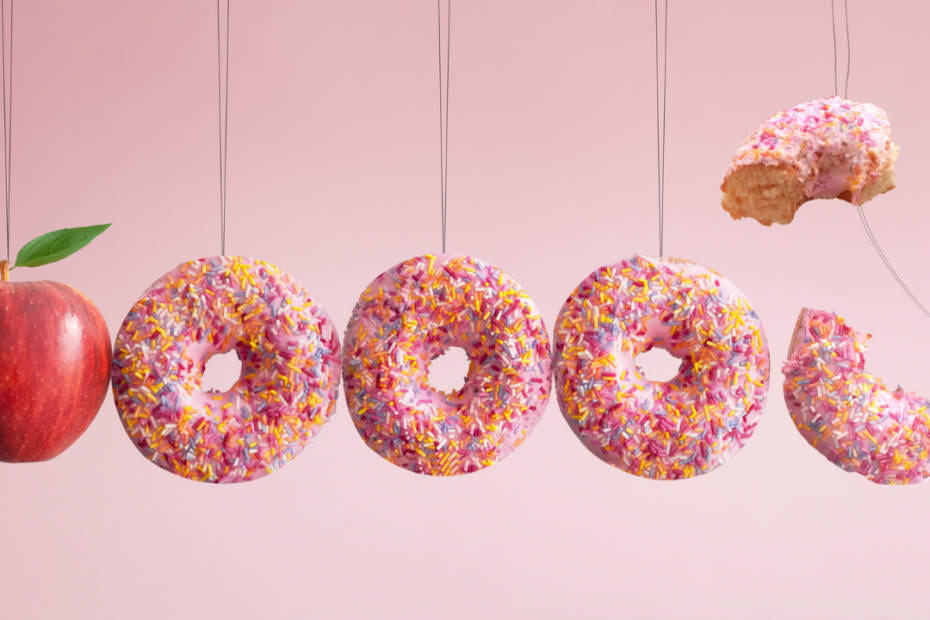[buzzsprout episode=’6785830′ player=’true’]
After our last couple of posts surrounding diet culture and the psychological toll chronic dieting could take on your mental health, I thought today would be a great time to discuss the inherently close connection between psychology and nutrition. So much of what we talk about in terms of nutrition actually concerns psychology. A very frequently asked question I get is how to deal with impulse control. Before we talk about that, let’s talk about what cues impulse… cravings.
A craving is defined as a powerful desire, our cravings drive us. Whether for love, money, power, fame, or something as simple as chocolate. Cravings for vegetables and healthier snacks are rare, but if you have them, I salute you. When we have cravings for foods that are high in sugar, fats, salts, and carbs it triggers the release of natural opioids, which give us a sense of pleasure. In fact areas of the brain associated with drug cravings light up when people crave a specific food. Furthermore, blocking opiate receptors in the brain cuts cravings for fat and sugar. As we talked about In our previous episode “why diet culture sucks”, hormones play a role in cravings too. Ghrelin, which is the hunger hormone, naturally goes up and down before and after a meal. Ghrelin plays a role in our natural preference for sugar as well as our likelihood for giving into cravings for comfort foods. In a 2015 study, researchers found that ghrelin increased after a high calorie meal full of sugar and fat, but decreased after a healthier meal with complex carbohydrates and protein. This suggests, what researchers call, hedonic food consumption, which is what’s happening when your chocolate croissant from Starbucks tastes suspiciously like a pastry sprinkled with crack. In a hormonal double whammy, eating for pleasure also went along with decreased levels of the hormone that influences satiety. This is definitely not helpful in todays day and age when most of us work across the street from a restaurant or bakery shop.
A craving is completely different from a binge. A binge feels like you are out of control, and is usually driven by stress, and is often, but not always categorized as using food to fill an emotional void. There are 4 main culprits of cravings:
Craving culprit #1: emotional eating. Which is also called stress eating. If you’re craving a cookie but eat a carrot, chances are you’re just going to eat the cookie in a few minutes… plus a few extra. Deal with that craving and emotion right then and there, and you’ll thank yourself in the long run.
Craving culprit #2: Boredom. Boredom eating is usually sparked by restrictive dieting or monotone dieting, where you are eating the same foods day in and day out. This type of eating usually lights a fire under your cravings due to the lack of variety in foods on a daily basis. Try switching up the monotony. Cycle your veggies, try different carbohydrate options, and mix up your protein choices. This will help kill the boredom cravings.
Craving culprit #3: Deprivation: Snowballing off of the last statement, dieters often cut out “bad foods”, however, disallowing certain foods works about as well as suppressing your feelings for years and years… it doesn’t. Because you have to remember what you’re not supposed to think about or what you’re not supposed to eat, it’s always on your mind. Eat what you like in sensible amounts before the cravings start to build up.
Craving culprit #4: Plain ol’ hunger. If it’s been more than a few hours since you ate, it might not be a craving per say, but simple hunger. The difference is hunger is satisfied by any kind of food, where as a craving is only satisfied by one food. So if everything behind the deli case looks good, you’re probably just hungry. Also cravings are like storms, they fizzle and pass. Let the craving sit for a while and if it passes, you know it was just a craving.
The majority of the time we view cravings as emergencies. So instead of getting swept up into the “I need it now” mindset, tell yourself you can have that craving in 30 minutes… chances are when that 30 minutes passes you will have forgotten all about it. If not, then go ahead and treat yourself but sparingly. Remember, don’t ignore your body’s signals. We don’t want this to turn into a snowball effect, and before you know it, you’ve gone through the whole box of chips a’hoy. Hey… it’s happened to the best of us.
If you’d like to listen in to this episode, tune into the Bites Radio podcast above. If you’d like to keep up to date on all the latest, comment or join the conversation, be sure to head over to the bites radio Facebook page, or follow me on Instagram! And lastly, if you liked todays blog post or previous posts, be sure to subscribe to the Bites Radio podcast for weekly bites of nutrition knowledge!
